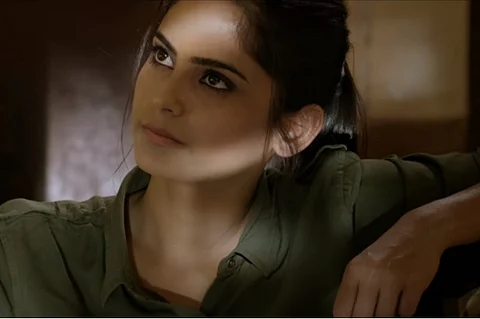

Ram Gopal Varma, in recent times, is most known for directing mindless films that are complete disasters from the minute the theatre darkens. Remember the terrible remake of Sholay, Ram Gopal Varma Ki Aag? Or the gore-filled, horrific films, Not a Love Story and Rakht Charitra? To jog your memory further, he’s also known for passing sexist, controversial comments about Bollywood actor, Sunny Leone.
Now, in an era where discussions about women's empowerment and individuality of choices take place in public spaces, RGV has decided to add his two cents to it with a new short film, Meri Beti Sunny Leone Banna Chahti Hai. In his attempts to sound ‘progressive’ and break societal stereotypes, RGV has walked into yet another disaster.
The 11 minute 29 second short film goes against the exact concept it seems to be talking about - women's empowerment.
Let’s dissect it, shall we?
The story revolves around a conversation between a young woman (Naina Ganguly) and her furious parents (Makrand Deshpande as the father and Divya Jagdale as the mother), where she tells them that she wishes to become like a porn star like Sunny Leone, because her sexuality is the path to fame and success.
Sunny Leone, a former adult film star, is a successful entrepreneur and Bollywood actor. She's got her personal line of perfume and also participates in social activism. However, the film is not interested in exploring all these facets to her public and professional life.
We get it.
The character in the film is trying to push her conservative, middle-class parents to understand that every woman is free to make her own choice and that depriving her of doing so is sexist and discriminatory. But if there were a hundred ways to put that message forward, RGV’s short film picks the worst possible way to do it through dialogues like “Aurat ki value sirf uske sundarta and sex appeal mein hai”.
Last we checked, there’s more to a woman than her sex appeal. And there's more to her sex appeal than only her body. If RGV really wanted to talk about powerful, successful woman, there are hundreds in India alone. His skewed understanding of a woman's sexuality shows why he picked Sunny Leone and subjected her to this reduction.
RGV also attempts to take a stab at India’s patriarchal society’s mindset. The protagonist rattles on about how from ancient times, men have suppressed women’s thinking and confined them into a box where they are to save their bodies just for one man, look after the house, pleasure them in bed and ultimately spurt out children like a machine.
RGV resorts to decrying marriage as a regressive institution, where the woman serves as a prisoner with a life sentence, and then suggests a bizarre solution: the only way to break free from the clutches of patriarchy is to strip and use your body. Can’t it also be done by, well, using logic and reason?
RGV’s ‘use-and-throw’ concept is flawed on multiple levels as well. It implies that every person, man or woman, is ultimately disposable. And in this case, are we trying to say that a woman is valuable only till she has perky breasts, a wrinkle-free face with a bright smile, and a head full of thick, black/brown hair?
The short films ends with a message, straight from the director’s heart - “I sincerely believe women empowerment should have no discrimination. Her power should be her choice”.
We sincerely believe that Ram Gopal Varma should avoid spreading messages about female objectification under the guise of women's empowerment. We suggest that he first reads up on women's empowerment, female sexuality and gender equality. And if he still doesn't get it, quit subjecting his viewers to more films like this one.